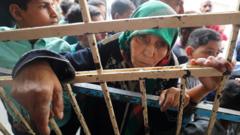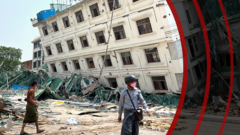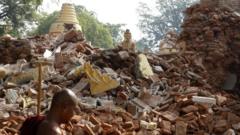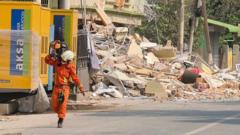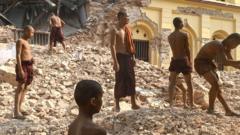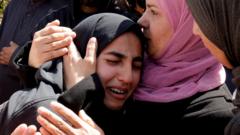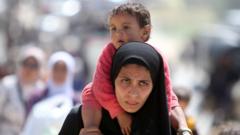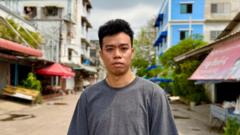The devastating 7.7 earthquake that hit Mandalay last Friday has transformed this historic city, once celebrated for its beauty, into a scene of unimaginable suffering.
Mandalay’s Tragedy: From 'City of Gold' to Graveyard of Despair
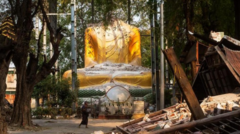
Mandalay’s Tragedy: From 'City of Gold' to Graveyard of Despair
A powerful earthquake ravages Mandalay, leaving destruction and grief in its wake.
Mandalay was once dubbed the 'city of gold' with its shimmering pagodas and rich culture. However, following a catastrophic 7.7 magnitude earthquake last Friday, it now stands as a symbol of disaster, where the air is heavy with the stench of death. The toll from this tragedy has surpassed 2,700 dead, with over 4,500 injured and countless others still unaccounted for, according to the Myanmar military chief's reports.
Residents of Mandalay, Myanmar's second-largest city, describe restless nights filled with despair as essential resources like food and clean drinking water dwindle. A local student lamented the loss of her aunt, whose body emerged from the rubble days later. The struggling infrastructure and ongoing civil conflicts complicate the already dire relief efforts as the military regime historically downplays such disaster scales.
Among the rubble, survivors such as J, a resident from Mahaaungmyay district, express their emotional exhaustion, with many camping in the streets out of fear that their homes might not withstand aftershocks. Official reports indicate that at least 403 people have been rescued in the past four days, but experts suggest that the death toll could exceed 10,000 due to the quake's magnitude and region characteristics.
Children's trauma has emerged as a heartbreaking consequence of this disaster. A clergy member shared that his eight-year-old son has experienced frequent emotional breakdowns since witnessing devastation in their neighborhood. As local authorities confront an overwhelming number of fatalities, crematoriums are operating beyond capacity due to a lack of resources, including body bags and food supplies.
The humanitarian situation is further complicated by the political landscape: Myanmar remains crippled by a civil war and a struggling economy after the military coup in 2021. Commemorations for the deceased included a minute of silence across the nation, as the government sought to mitigate public relations fallout by emphasizing their attempts to aid the affected.
International assistance has begun trickling in from allies, including Russia and China, but local reports highlight the military's stringent restrictions on aid access to the quake-affected areas. Rights groups have called out the junta for their oppressive tactics, arguing that immediate aid must be prioritized. "The junta must cease its brutal practices and ensure that help reaches those in critical need,” urged Human Rights Watch's deputy Asia director. Even amidst the devastation, military operations have reportedly continued in certain regions.
As Mandalay grapples with its profound losses, the road to recovery remains fraught with challenges, as both the community and humanitarian teams face an uphill battle in overcoming the fallout from this tragic event.
Residents of Mandalay, Myanmar's second-largest city, describe restless nights filled with despair as essential resources like food and clean drinking water dwindle. A local student lamented the loss of her aunt, whose body emerged from the rubble days later. The struggling infrastructure and ongoing civil conflicts complicate the already dire relief efforts as the military regime historically downplays such disaster scales.
Among the rubble, survivors such as J, a resident from Mahaaungmyay district, express their emotional exhaustion, with many camping in the streets out of fear that their homes might not withstand aftershocks. Official reports indicate that at least 403 people have been rescued in the past four days, but experts suggest that the death toll could exceed 10,000 due to the quake's magnitude and region characteristics.
Children's trauma has emerged as a heartbreaking consequence of this disaster. A clergy member shared that his eight-year-old son has experienced frequent emotional breakdowns since witnessing devastation in their neighborhood. As local authorities confront an overwhelming number of fatalities, crematoriums are operating beyond capacity due to a lack of resources, including body bags and food supplies.
The humanitarian situation is further complicated by the political landscape: Myanmar remains crippled by a civil war and a struggling economy after the military coup in 2021. Commemorations for the deceased included a minute of silence across the nation, as the government sought to mitigate public relations fallout by emphasizing their attempts to aid the affected.
International assistance has begun trickling in from allies, including Russia and China, but local reports highlight the military's stringent restrictions on aid access to the quake-affected areas. Rights groups have called out the junta for their oppressive tactics, arguing that immediate aid must be prioritized. "The junta must cease its brutal practices and ensure that help reaches those in critical need,” urged Human Rights Watch's deputy Asia director. Even amidst the devastation, military operations have reportedly continued in certain regions.
As Mandalay grapples with its profound losses, the road to recovery remains fraught with challenges, as both the community and humanitarian teams face an uphill battle in overcoming the fallout from this tragic event.


